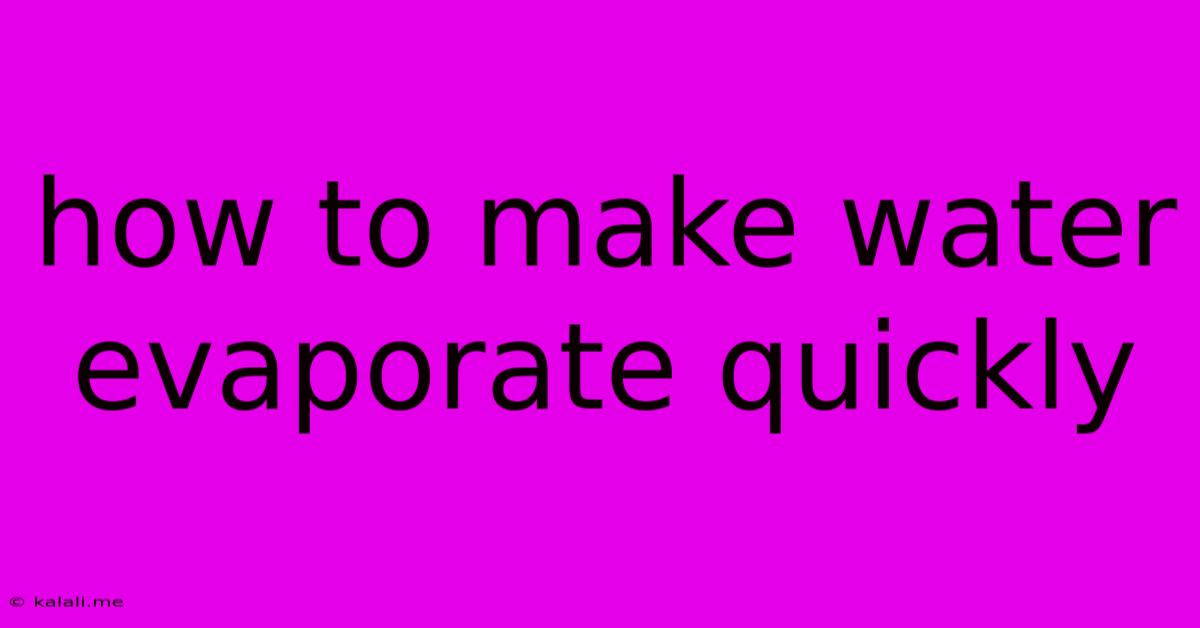How To Make Water Evaporate Quickly
Kalali
Jun 03, 2025 · 3 min read

Table of Contents
How to Make Water Evaporate Quickly: A Comprehensive Guide
Water evaporation is a natural process, but sometimes you need to speed it up. Whether you're dealing with a spilled puddle, trying to dry clothes faster, or conducting a science experiment, understanding how to accelerate evaporation can be incredibly useful. This guide explores various methods and factors influencing the rate of evaporation, helping you achieve faster results.
Factors Affecting Evaporation Rate: Before diving into techniques, let's understand what influences how quickly water turns into vapor. These factors are crucial for optimizing your evaporation process.
- Temperature: Higher temperatures lead to faster evaporation. Warmer water molecules possess more kinetic energy, allowing them to overcome intermolecular forces and escape into the atmosphere more readily.
- Surface Area: A larger surface area exposes more water molecules to the air, increasing the rate of evaporation. Think of a shallow dish versus a deep cup – the shallow dish will dry out faster.
- Humidity: Lower humidity means less water vapor already in the air, creating a greater capacity for more water to evaporate. High humidity slows down the process significantly.
- Airflow: Moving air sweeps away evaporated water molecules, preventing saturation and encouraging further evaporation. A breeze or fan can dramatically increase the rate.
- Atmospheric Pressure: Lower atmospheric pressure reduces the resistance water molecules face as they transition to vapor, hence speeding up evaporation.
Practical Methods to Accelerate Water Evaporation:
Now, let's explore practical methods based on manipulating the factors above:
1. Increasing Temperature:
- Sunlight: Exposing water to direct sunlight is a simple and effective way to increase its temperature, accelerating evaporation.
- Heat Source: Using a heat source like a stove (carefully!), a hairdryer (on a low setting for safety), or a radiator can significantly speed up the process. Always prioritize safety!
2. Expanding Surface Area:
- Shallow Containers: Use shallow, wide containers to maximize the surface area exposed to the air.
- Spreading Out Liquids: If dealing with a spilled liquid, spread it out thinly to increase its surface area.
3. Reducing Humidity:
- Ventilation: Ensure good ventilation in the area to reduce humidity levels. Open windows and doors to allow air circulation.
- Dehumidifier: Using a dehumidifier in a closed space can significantly lower the humidity, promoting faster evaporation.
4. Increasing Airflow:
- Fan: Position a fan to blow air across the water's surface. This removes saturated air and encourages further evaporation.
- Breeze: If possible, place the water outdoors in a breezy location.
5. Reducing Atmospheric Pressure (Less Practical for Everyday Situations):
While reducing atmospheric pressure is generally not feasible for everyday evaporation tasks, it's a significant factor in higher-altitude regions where water evaporates more quickly.
Tips for Specific Scenarios:
- Drying Clothes: Hang clothes outdoors on a windy day, or use a clothes dryer.
- Drying Spills: Use absorbent materials like towels or paper towels to soak up excess liquid, then use a fan to speed up evaporation of the remaining moisture.
- Science Experiments: Control variables like temperature, airflow, and humidity to accurately observe and measure evaporation rates.
By understanding these factors and employing these methods, you can effectively control and accelerate the rate of water evaporation to suit your needs. Remember always prioritize safety when using heat sources or electrical appliances.
Latest Posts
Latest Posts
-
How Long The Application Will Abandon After Receiving Adisory Action
Jun 05, 2025
-
How To Fix Ripped Paint On Drywall
Jun 05, 2025
-
How Long Will A Sump Pump Last
Jun 05, 2025
-
How To Get Paint Off Wood Floor
Jun 05, 2025
-
How To Get Permanent Marker Off Wood Without Alcohol
Jun 05, 2025
Related Post
Thank you for visiting our website which covers about How To Make Water Evaporate Quickly . We hope the information provided has been useful to you. Feel free to contact us if you have any questions or need further assistance. See you next time and don't miss to bookmark.